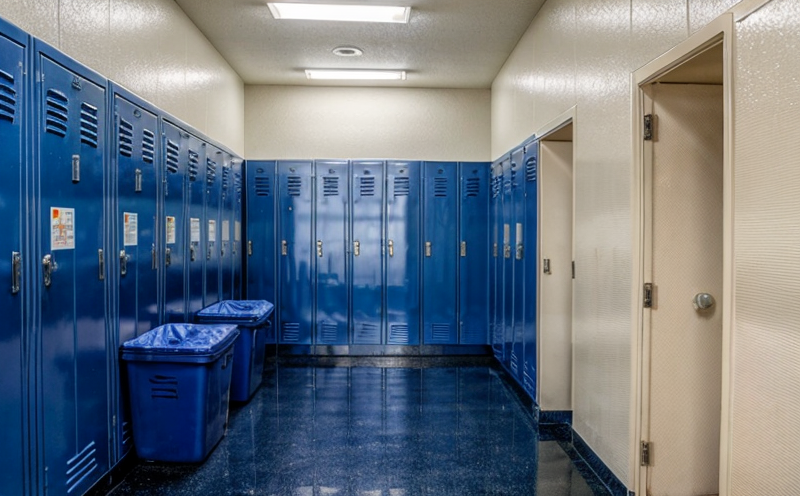Locker room hygiene inspection
The locker room hygiene inspection is a critical component of Environmental Health and Safety (EHS) management. Locker rooms, often shared spaces in workplaces or public facilities, are environments where hygiene levels can significantly impact health and safety. Poor hygiene conditions can lead to the spread of infectious diseases, skin irritations, respiratory issues, and other health hazards.
Given the high foot traffic and limited ventilation typical of locker rooms, regular inspections ensure that these spaces meet industry standards for cleanliness and safety. This service involves evaluating various factors such as cleanliness levels, proper waste disposal systems, air quality, water hygiene, and overall sanitation protocols. Compliance with relevant regulations like OSHA (Occupational Safety and Health Administration) and ISO 14001 is paramount.
The inspection process begins by assessing the visual appearance of the locker room. This includes checking for visible dirt, stains, or odors that may indicate poor hygiene practices. Next, water quality tests are conducted to ensure that the water used in showers and sinks meets potable water standards as defined by WHO (World Health Organization) guidelines.
Air quality is another crucial aspect of locker room hygiene inspections. High humidity levels coupled with limited ventilation can foster the growth of mold and mildew, which pose health risks to users. Instruments such as hygrometers are used to measure relative humidity, while air sampling devices help detect potential contaminants in the air.
Waste management is also a key focus during these inspections. Proper waste disposal systems must be in place to prevent the accumulation of garbage and debris that can serve as breeding grounds for pests or pathogens. Compliance with local regulations regarding hazardous waste handling further ensures environmental safety.
The inspection concludes by reviewing hygiene protocols followed by facility management teams. This includes checking if staff members are adhering to established cleaning schedules, using appropriate disinfectants, and implementing effective pest control measures. Regular training sessions for employees on proper hygiene practices are also evaluated as part of this comprehensive review process.
Why It Matters
The importance of locker room hygiene inspections cannot be overstated in maintaining a safe and healthy work environment. Poor hygiene conditions not only affect individual health but also contribute to higher absenteeism rates among employees, impacting overall productivity.
From an organizational perspective, investing in regular hygiene inspections helps build a positive corporate image by demonstrating commitment to employee well-being. It fosters trust between management and staff while reducing legal risks associated with negligence or violation of safety standards.
Incorporating locker room hygiene into broader EHS strategies ensures compliance with applicable laws and regulations, thereby protecting both employees and visitors against potential litigation arising from accidents or illnesses linked to unsanitary conditions.
Industry Applications
| Application | Description |
|---|---|
| Premier Corporate Offices | Ensuring that shared spaces are safe and hygienic for employees. |
| Public Libraries | Maintaining cleanliness in areas frequented by patrons of all ages. |
| Sports Facilities | Avoiding the spread of infections among athletes and spectators alike. |
| Healthcare Institutions | Protecting patients, visitors, and staff from cross-contamination risks. |
- Promotes a culture of cleanliness across all sectors.
- Reduces the risk of outbreaks within confined spaces.
- Enhances customer satisfaction in hospitality and tourism industries.
- Supports educational institutions by providing safe learning environments.
| Application | Description |
|---|---|
| Prisons | Maintaining health and safety standards for incarcerated individuals. |
| Hospitality Industry | Avoiding contamination in hotel rooms and guest areas. |
| Manufacturing Plants | Preventing cross-contamination between production lines or departments. |
Customer Impact and Satisfaction
Regular hygiene inspections play a vital role in enhancing customer satisfaction by ensuring that shared spaces meet high standards of cleanliness. This is particularly beneficial for organizations aiming to provide exceptional experiences to their patrons or employees.
By addressing potential issues before they escalate into larger problems, these inspections contribute significantly to maintaining a positive reputation among stakeholders. Additionally, they enable companies to proactively manage risks associated with poor hygiene practices, thereby fostering trust and loyalty within the community.





